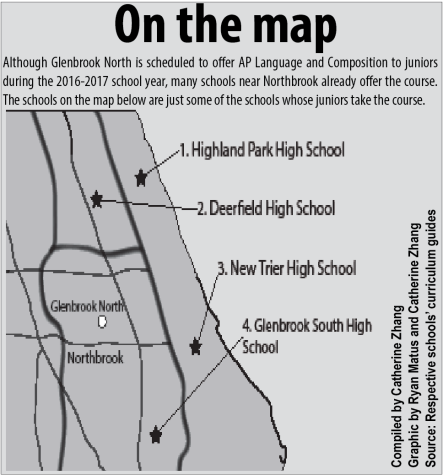Curriculum changes force incoming juniors to choose between AP, regular English

On any given day, students can hear the scratching of pens on paper or snippets of stressed conversation. Students can see juniors scrawling notes into novels like “Ceremony,” “Death of a Salesman” and “The Great Gatsby,” all a part of the current junior-level honors English 373 curriculum.
Some of these existing components of the curriculum may cease to exist. This is because English 373 is set to be replaced by AP Language and Composition 383 starting in the 2016-2017 school year.
Current sophomores at the honors level are only offered two options for their incoming junior year, AP Language and Composition 383 and the regular level English 363.
Ed Solis, instructional supervisor of the English department, said the change was partly made to give students more AP options and to possibly make them more desirable to colleges.
Solis said offering AP Language and Composition to juniors also helps maintain consistency within the district because Glenbrook South already offers this course to juniors, alongside many other schools in the area.
He said the current English 373 class deserves an AP title because it is as difficult as an AP course.
“Schools in the area offer two AP English classes during the four-year sequence, so this change gives students a chance to take and put on their transcript two AP English classes by the time they graduate,” said Solis. “If [students] do the hard work anyway for the junior honors program, then why not give them the AP credit if that’s what colleges want?”
Universities contacted did not respond to inquiries regarding the availability of an AP English class junior year and the impact it has on admissions.
Sophomore Rachel Bernstein said this decision is logical, but she sees potential conflict.
“On one hand, it gives students an opportunity to take the AP test and get AP credit without putting in a lot more work than if [the class] remained honors,” said Bernstein. “But it might leave students that don’t necessarily want to take AP hanging high and dry since there’s no middle option. It’s either AP or regular, and that could leave some students conflicted.”
Solis said shifting to the AP curriculum will incorporate more nonfiction into the class and enhance the current curriculum, but the class will not be much more difficult than the current honors English class.
English teacher Erica Henrich said creating the new junior curriculum is “a double-edged sword” because the current one is great, but some parts will have to be removed due to the new focus on the AP curriculum.
“It’s all about finding balance,” said Henrich. “Moving forward, we’re going to be very careful and deliberate about the choices made and try to keep what fits and what we’ve had success with, but also add new aspects so the course will genuinely be an AP course.”
This change has also stirred frustrations in some students.
Junior Ellie Kim said she feels agitated because the amount of work she does is similar to the amount of work juniors would do next year but will not receive AP credit.
“[My friends and I] were angry we couldn’t get AP credit or recognition because we like to be challenged and motivated, but won’t get that opportunity,” Kim said.
Senior Melanie Holpert said many seniors are also jealous and wish they could have taken more AP classes.
According to Solis, seniors will be offered AP Language and Composition 483, but juniors and seniors would not be in the same classrooms, and their classes will study different materials. The senior level class will be removed after the 2016-2017 school year, and AP Literature will be the only AP English course available to seniors.
Holpert said because AP Language and Composition 483 is currently thought of as an easier course than English 373, the standards and tenacity of honors should remain, even if content changes to allow future juniors to benefit from the new AP curriculum.

